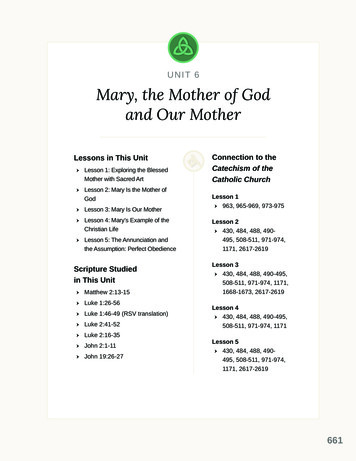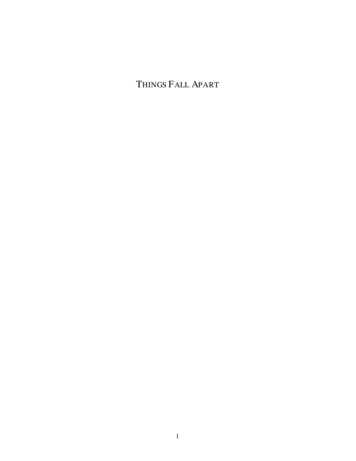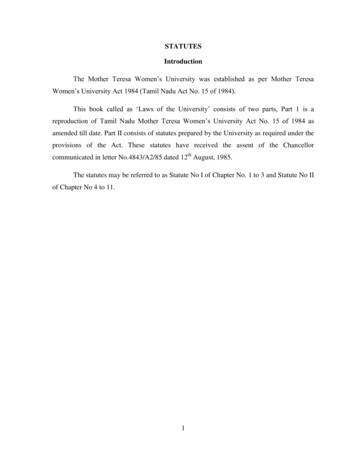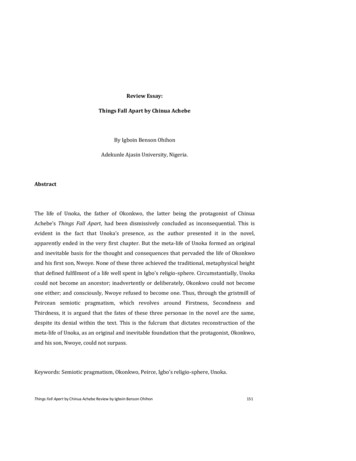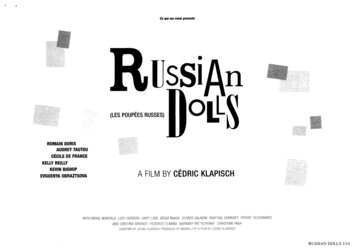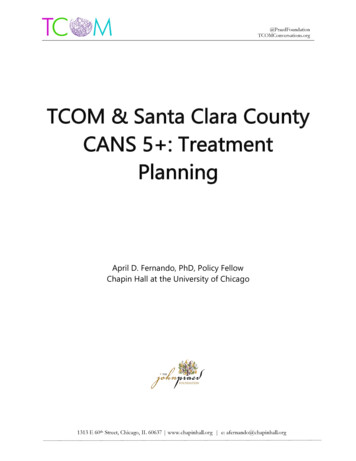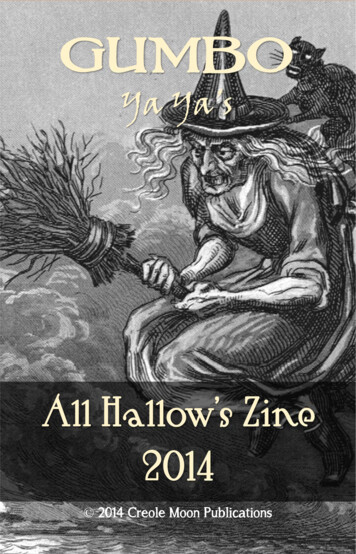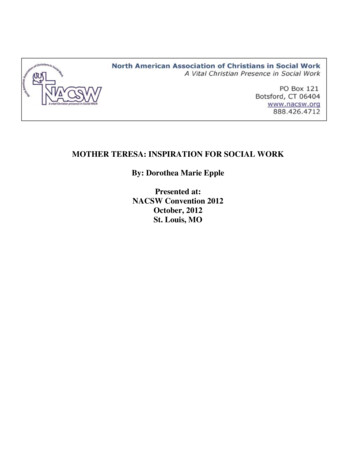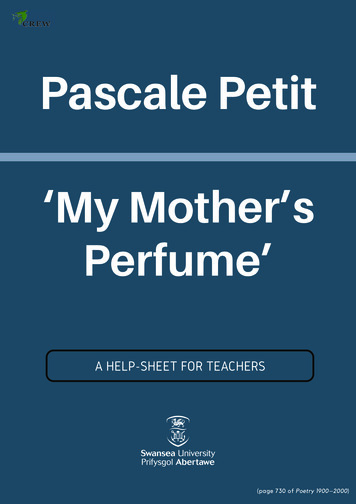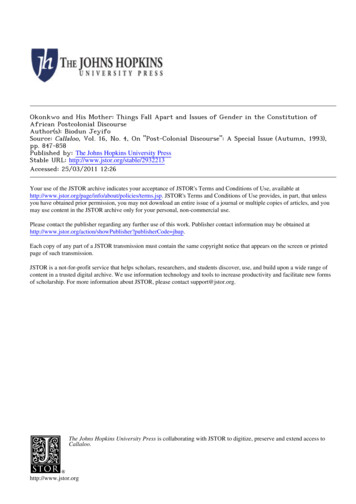
Transcription
Okonkwo and His Mother: Things Fall Apart and Issues of Gender in the Constitution ofAfrican Postcolonial DiscourseAuthor(s): Biodun JeyifoSource: Callaloo, Vol. 16, No. 4, On "Post-Colonial Discourse": A Special Issue (Autumn, 1993),pp. 847-858Published by: The Johns Hopkins University PressStable URL: http://www.jstor.org/stable/2932213 .Accessed: 25/03/2011 12:26Your use of the JSTOR archive indicates your acceptance of JSTOR's Terms and Conditions of Use, available at ms.jsp. JSTOR's Terms and Conditions of Use provides, in part, that unlessyou have obtained prior permission, you may not download an entire issue of a journal or multiple copies of articles, and youmay use content in the JSTOR archive only for your personal, non-commercial use.Please contact the publisher regarding any further use of this work. Publisher contact information may be obtained at erCode jhup. .Each copy of any part of a JSTOR transmission must contain the same copyright notice that appears on the screen or printedpage of such transmission.JSTOR is a not-for-profit service that helps scholars, researchers, and students discover, use, and build upon a wide range ofcontent in a trusted digital archive. We use information technology and tools to increase productivity and facilitate new formsof scholarship. For more information about JSTOR, please contact support@jstor.org.The Johns Hopkins University Press is collaborating with JSTOR to digitize, preserve and extend access toCallaloo.http://www.jstor.org
OKONKWO AND HIS MOTHERThings Fall Apart and Issues of Gender in the Constitution ofAfrican Postcolonial DiscourseBy BiodunJeyifoIn the oral tradition, we often do not know whether the storytellerwho thought up a particularstory was a man or a woman. Of coursewhen one examines the recorded texts, one might wonder whethera myth or story doesn't serve particularinterests in a given society.-Mineke SchipperThe Chielo-Ezinma episode is an important sub-plot of the noveland actually reads like a suppressed larger story circumscribed bythe exploration of Okonkwo's/man's struggle with and for hispeople. In the troubled world of ThingsFallApart,motherhood andfemininity are the unifying mitigating principles, the lessons forAfrica and the world.-Carole Boyce DaviesSo Okonkwo encouraged the boys to sit with him in his obi,and hetold them stories of the land-masculine stories of violence andbloodshed. Nwoye knew that it was right to be masculine and to beviolent, but somehow he still preferred the stories that his motherused to tell him, and which she no doubt still told to her youngerchildren-stories of tortoise and his wily ways, and of the birdwho challenged the whole world to a wrestling contesteneke-nti-obaand was finally thrown by the cat.That was the kind of story thatNwoye loved. But he now knew that they were for foolish womenand children, and he knew that his father wanted him to be a man.And so he feigned that he no longer cared for women's stories.-Chinua Achebe, ThingsFallApart [my emphasis]Okonkwo's mother?Within the total narrative space of ThingsFallApart'there is onlyone direct, substantive mention of our hero's mother. As far as I know, this has never beenformally registered in the extensive discussions and commentaries on the novel, let alonecritically explored, and this seems quite consistent with the author's more evidentinterest in the complex, tortured relationship of Okonkwo with his father and, later in theconcluding sections of the novel, with his son Nwoye. As Carole Boyce Davies remarksin the articlefrom which the second epigraph to this essay was extrapolated, in ThingsFallApart Achebe's "primary concern is woman's place within larger social and politicalforces" (247) which are, in the order of things, the spheres of male initiatives and control.Callaloo16.4 (1993) 847-858
- -CALLALOOAnd yet the single, brief mention of Okonkwo's mother is extraordinarily suggestiveboth for reading Okonkwo's particular brand of misogyny and neurotic masculinistpersonality and for analyzing larger questions of the author's construction of malesubjectivity and identity in the novel. This "new" reading would indeed be a re-readingwhose condition of possibility derives from the manifold feminist project that is such adecisive, perhaps the most decisive current of postcolonial critical discourse at thepresent time.2 In this short paper, I shall examine this one substantive reference toOkonkwo's mother in fairly close detail, hoping to deploy this close textual exegesis asa bridgehead to a more general discussion of gender-related issues in the constitution ofa postcolonial African criticaldiscourse. I shall be arguingin effect that between Achebe's"under-textualization" of Okonkwo's mother and a feminist re-reading of the novelwhich would foreground her and relocate the "motherlore"she represents in the intensegender politics of the novel, we encounter an instance of the fundamental challengeposed by issues of gender in postcolonial criticism and scholarship. The point has beenrepeatedly made that the nationalist"master texts" of African postcolonial literature,needed,as the basis of their self-constitution as representative,canonical works, to subsumegender difference under the putatively more primary racial and cultural difference of aresisting Africa from a colonizing Europe.3 By this occlusion of gender difference,Okonkwo's mother, his wives and daughters recede into the groundwhich enables thefigure of Okonkwo and his father and son to achieve their representational prominence.But beyond this "programmatic"under-textualization of Okonkwo's mother, ThingsFallApart,as a powerful work of realist fiction, could not fail to inscribe the effects of sexualdifference and gender politics within the very 'over-textualization" of "men's affairs"inthe novel, this being the social totality of the precolonial order as it comes into contactwith the invading colonial capitalism. This has an important politicallesson: nationalliberation in Africa, as long as it remains a historic agenda enforced by neocolonialdependency and arrested decolonization,4 and as it is profoundly inflected by new postnationalist discourses and cultural production, must reconfigure its founding moment asnot irredeemably marked by an inevitable, naturalsexism.The allusion to Okonkwo's mother occurs in chapter nine of the novel; significantly,she is not named. The precise narrative moment seems, on the surface, of no particularthematic noteworthiness: three days after his participation in the ritual murder of theyouth Ikemefuna, his "adopted" son, Okonkwo is just beginning to emerge from theemotional and spiritual trauma of that event. Characteristically,it irks him that he hasindeed been weak and "unmanly" enough to have succumbed to the trauma. Indeed thewhole episode lasts one short paragraph and can thus be quoted entirely:For the first time in three nights, Okonkwo slept. He woke up oncein the middle of the night and his mind went back to the past threedays without making him feel uneasy. He began to wonder why hefelt uneasy at all. It was like a man wondering in broad daylightwhy a dream had appeared so terribleto him at night. He stretchedhimself and scratched his thigh where a mosquito had bitten him ashe slept. Another one was wailing near his right ear. He slapped theear and hoped he had killed it. Why do they always go for one'sears? When he was a child his mother had told him a story about it.848
CALLALOOBut it was as silly as all women'sstories.Mosquito, she had said, hadasked Ear to marry him, whereupon she fell on the floor in uncontrollable laughter. "How much longer do you think you will live?",she asked. "You are already a skeleton." Mosquito went awayhumiliated, and anytime he passed her way he told Earthat he wasstill alive. (53, my emphasis)It is significant that in the very next sentence after this recalled story we are told:"Okonkwo turned on his side and went back to sleep." Like the mosquito bite whichpresumably worried his brief wakeful moment within a restful sleep only as a very minorirritation, Okonkwo's memory of his mother's stories in his childhood is very easilysuppressed; and it is easily consigned to the domain of "silly women's stories." Thisseems quite consistent with the larger pattern of intra-familial and inter-generationalconflicts elaborated in the novel: Okonkwo's relationship with his father, and later hisrelationship with his son, Nwoye, are foregrounded over relationships with his namelessmother, his wives, and his daughters. From a feminist perspective, this, more thananything else, reveals the male-centeredness of Achebe in this novel. While this isincontrovertible, it is only part of the story, and it barely scratches the surface of thecomplex and ambiguous gender politics of the text of ThingsFallApart.This point needssome elaboration.As the third of the epigraphs to this essay indicates, Okonkwo's son, Nwoye, unlikehis father, does not succeed in completely repressing either the memory of his mother'sstories, or their powerful, subliminal hold on his imagination and psyche. Consequently,he has to feign a "manly" indifference to this motherlore. Okonkwo, by contrast, seemsto have succeeded completely in a willed amnesia of his mother's creative role in theformation of his personhood, his sensibility. Indeed the precise nature of this willedamnesia is awesome: while his father, Unoka, perpetually figures in both his psyche andhis vigilant, conscious mind as an active, powerful (if negative) presence, Okonkwo'smother is assimilated into the neutral, abstract function of "mothers in general." ForOkonkwo, his mother's stories and their significations evaporate into the generalizedphallogocentric rubric of the "silliness" of motherlore. The catch in all of this is thatneither this particular story, nor the many other women's stories given in Things FallApart, is silly; rather, in almost every instance, these stories are only deceptively simpleand are usually of extraordinary emblematic, subversive resonance to the centralnarrativeof Okonkwo's obsession with his fatherand his sons.5A close look at Okonkwo'smother's story and its narrative of the fractious, bitter liaison between Earand Mosquitoillustrates this point well.Perhaps the most arresting detail in this story is the structure of reversals of genderhierarchy between the respective female and male personae in the tale. Thus Ear, thefemale persona, is the dominant, supercilious agent in the conflict. Mosquito, the malesuitor, not only figures as an atrophied, diminished, "inadequate" phallus; the verymanner and terms of his rejection strike deep: loss of vital powers unto death ("You arealready a skeleton"!). Since this tale is told by Okonkwo's mother and thus belongs inmotherlore,we can surmise that Mosquito here encodes the male's neurotic fear of femalepower as the nemesis of male potency and life-force. Putative female superiority in thisvertical structure is compounded by Ear'sadditional figuration in traditional mytholog849
CALLALOOical anthropomorphism of the Body and its organs as bothmale and female, as Trinh T.Minh-ha tells us in her book, Woman,Native, Other:. As a wise Dogon elder [Ogotemmeli] pointed out, "issuing froma woman's sexual part, the Word enters another sexual part,namely the ear" (the ear is considered to be bisexual, the auriclebeing male and the auditory aperture, female.). (127)The embodiment of abstract female power in this system of significations is particularly noteworthy in the way that it combines both "male" and "female" principles andtheir elaborated attributes and values. This, however, is a structure unperceived byOkonkwo and is indeed alien to his rigid, overliteral conceptions of the "masculine"ideals.Is it of little or no consequence to the gender politics in the text of ThingsFallApartthatabstract female power represented by the Ear and abstractmale identity represented bythe Mosquito are so vastly unequal in suppleness, vitality and resonance? In other words,is this story, told by Okonkwo's mother, and with all its powerfully resonating meanings,a mere narrative detail, a figural embellishment of the text bearing little relevance to thecentral conflict of Okonkwo's masculinist personhood which is lodged elsewhere, that iswith the father and the Law of the Father?There is absolutely no question that this tale of Okonkwo's mother, obviously drawnfrom the vast repository of motherlore, is centrally linked to Achebe's critical construction of Okonkwo's masculinist personality as this is conflictually played out, first withhis father, then with his son. And this is all of one piece with the overabundant inscriptionin the novel of its protagonist's obsession with maleness,and his corresponding fear of,and suppression offemaleness.However, the majorinterpretive problem that we confronthere seems to be that while femalenessas we encounter it in Okonkwo's mother's tale isa superior, stronger entity which confronts male identity with belittlement and insecurity, femaleness, as Okonkwo encodes it, is the exact opposite: weakness, fecklessness,cowardice, irresoluteness,sentimentality.In effectthis means that in the light of Okonkwo'speculiar construction of "female" attributes, the personae of his mother's tale would bereversed: Ear would represent male superiority and Mosquito would represent femaleshrewishness. But this hardly resolves this issue, as long as Okonkwo operates as anisolated figure removed from the social context of his Umofia community. Moreover,given Okonkwo's excessively literal phallocratic imagination, it would be as much of anabsurdity to represent "maleness" by an orifice in the body as it would be to represent"femaleness" by the mosquito with its broomstick figure. Nothing reveals this crude,physical phallicism more than the fact that the gun, the machete, and the cudgel (for wifebeating and child beating), three over-literal extensions of an aggressive, neuroticmasculinist identity, are Okonkwo's ultimate answers to any and all crises, and we seethis in several incidents in the novel: the incident with the beating of his second wifeduring the peace week; the episode of the severe beating of his son, Nwoye, when theunhappy youth was spotted among the new community of Christian converts; and theclimactic moment of the novel which results in Okonkwo's beheading of the first in theline of the advancing party of the hirelings of the colonial administration who had cometo break up the village assembly at the end of the novel.850
CALLALOOThis problem of Okonkwo's negative transvaluationof female strength and superiorityin his mother's tale to weakness and inferiority, however, disappears once we placeOkonkwo in the context and nexus of his society's moral economy and symbolic codes.6This is a historically and culturally constructed context; it is a precapitalist, pre-feudalsocial formation in which, as amply demonstrated in Ifi Amadiume's Male DaughtersandFemaleHusbands,"maleness" or "femaleness," the category "man" or "woman," do notoperate as rigidly divided, biologically literal or ontological entities.7 And Achebe'srealist integrity renders this structure felicitously. Indeed ThingsFallApart not only hasone of the most extensive and dense novelistic inscriptions of the genderizationofsubjectivity, signification and social space in postcolonial African fiction; the novel'sovercoded inscription of the processes of en-gendering is massively fractured andambiguous and cannot be read as a simple, unambiguous inscription of phallocraticdominance. Let me cite only one composite group of these ambiguous inscriptions ofgender and gender relations in the present context. Thus, on the one hand, Okonkwo'srepresentation of "femaleness" as weakness and irresoluteness seems to have validationin the system of division of cognitive and perceptual categories in his society whichascribes the designation "female"to smaller crops like the cocoyam and the designation"male" to bigger crops like the yam, a system which also describes an "ochu" (abomination) as either "female" or "male" depending on the degree of threat or destabilizationto the social order that it poses. But on the other hand, the same panoply of symbolicvalues and cognitive codes describes as "female"the most important deity in the religionand sacred lore of the community (Ani), making her priest male(Ezeani);conversely, theimportant deity of the Oracle of the Hills and the Caves is "male" while his highestfunctionary is the priestessChielo.On a different but related note, it is important to stress the limits of a psychologisticreading of the relationship of Okonkwo to his parents and his sons and daughters whichmight fasten one-sidedly on his relations with his father and later with his son. It is indeedtempting to read an Oedipalization in the fact that almost everything that we are toldabout Unoka, Okonkwo's father, can be symbolically assimilated to the figure of themosquito in the mother's story. By this reading, the driving fear of 'femaleness" inOkonkwo's psyche is thus really both "guilt"for the father's fate of "mosquito" vitiationand eventual "death,"and strong identification with and 'possession" of the mother. Butthis is purely speculative and a rather sterile and fanciful, if fascinating, line of criticalinquiry. Okonkwo both loathes the memory of his father and represses the lore of hismother; in the process he distorts both the "masculine" and the "feminine," by keepingthem rigidly apart and by the ferocity of his war on the "feminine." His son, on the otherhand, only feigns acceptance of this rigid masculinist code, but keeps alive the memoryof motherlore in his conflicted, sorrowing consciousness. One crucial difference betweenfather and son takes us beyond the purely psychologistic. This is the fact that the driving,all-consuming ambition of Okonkwo to be one of "the lords of the land," to take thehighest title which only few men (and no women) ever manage to achieve within thecourse of several generations, this ambition in the service of material interests and socialrecognition of the highest kind, is absent in the son. Throughout the course of the novel,the evolving moral and spiritual sympathies of Nwoye move him away from suchworldly sights to identification with the unprotected and "unprotectable"of his culture,those immiserated by the contradictory codes and practices of his society. We can indeed851
CALLALOOsay that within the gendered scale of valuations and representations by which Okonkwoseeks to establish the greatest possible distance between himself and his father's "effeminacy," his son Nwoye is "feminized": he refuses Okonkwo's interpellative call to be a"man"contemptuous of "female"attributes.This important distance between father andson is eloquently but succinctly captured in the economy of the following short passage:The missionary ignored him and went on to talk about the HolyTrinity. At the end of it Okonkwo was fully convinced that the manwas mad. He shrugged his shoulders and went away to tap hisafternoon palm-wine. But there was a young lad who had beencaptivated. His name was Nwoye, Okonkwo's first son. It was notthe mad logic of the Trinity that captivated him. He did notunderstand it. It was the poetry of the new religion, something feltin the marrow. The hymn about brothers who sat in darkness andfear seemed to answer a vague and persistent question that haunted his young soul in the question of twins crying in the bush and thequestion of lkemefuna who was killed. He felt a relief within as thehymn poured into his parched soul. The words of the hymn werelike the drops of frozen rain melting on the dry plate of the pantingearth. Nwoye's callow mind was greatly puzzled. (103)In the first epigraph to this essay, Mineke Schipper raises the important question ofthe gender(ed) provenience of stories and fictions in the precolonial oral traditions andthe particular interests which such gender origins might serve. This question is at theheart of one of the majorissues in African criticaldiscourse at the present time: the projectof reclaiming a separate, distinct tradition of African female writing and criticism whichis not easily, indeed WILLNOT BEsubsumed within the male-dominant tradition which,to date, has claimed to speak for the wholeof African literary and critical traditions. It isimpossible to take a full measure of this project without realizing that its objective is notmerely to "correct"the stereotypes and misconceptions of the male-centered writers andcritics, and not merely, in the words of the editor's comments in the African LiteratureTodayissue on "Women," that African women now seek "to take their stand by theirmen,"8but rather to reclaim "women's stories" (herstory) from the void or repressedzones into which men and male-centeredness had consigned them. For just as thenationalist anti-colonial counter-discourse in literatureand criticism once had to re-writeand reinvent a presencethat colonialist discourse, in its arrogance, imposture, andtriumphalism, had theorized as absence, so also women writers and critics have torecover the submerged female tradition. What contemporary African feminist criticismat this level of self-authorization adumbrates is a return tofemalesources within Cabral'sfamous call for a return to "the source," or more radically, female sources as the source.In other words, the identification of creative female precursors or foremothers, and ofdiscrete intertextual revision and influence between female and female-centered writersand critics, defines the most radical autonomization of gender difference in feministAfrican criticism at the present time. Particularly powerful instances of this expressionare Chikwenye Okonjo's "The Dynamics of the Contemporary Black Female Novel inEnglish," and an important essay by Florence Stratton which I now examine in thecontext of our reflections in this essay.852
CALLALOOIn "Periodic Embodiments: a Ubiquitous Trope in African Men's Writing," a trenchant critique of the male-dominant tradition of post-colonial African writing, FlorenceStrattonhas uncovered, as few other feminist criticalwritings have done, the depth of themale-centeredness or phallocentrism of this tradition. According to Stratton, this maledominant, male-centered tradition, given the fact and consequences of historic colonization, has been largely constructed around woman as the "embodiment" of the malewriters' vision of the new African nation in all its changing historical experience, fromcolonial humiliations and anti-colonial struggles to the postcolonial agony of neocolonialism and virtual recolonization. Furthermore, Stratton avers that in making these"periodic embodiments" of woman as ideal symbol and representation of the nation,male writers have basically assumed that man is the visionary, the artist,the maker of thehistory of the nation, and woman the sign (of national or racial integrity, resistance andsovereignty) mobilized by male creativity, initiative, and revolutionary will. Perhaps themost telling point of Stratton'sforceful argument in this articleis the view that this deeplyphallocratic assumption goes beyond its usual identification with the conservativecurrent of the anti-colonial and postcolonial African male writer's idealization of womanas repository of cultural "essence," (what Stratton calls "the pot of culture" syndrome).Beyond this mostly Negritudist romantic-nostalgic idealization, Strattonalso assimilatesmale writers of a more radical anti-imperialist, even anti-sexist vision and sensibility likeSembene or Ngugi, to this whole tradition of "periodic embodiment." This critique ineffect implicates virtually all male African writers and critics.What this line of polemic and projection indicates is, I believe, that feminist criticism,even when it critically engages and contests both imperialist domination and postindependence misrule in the context of the postcolonial state, will not be content withhow women are positively depicted by certain "progressive" male writers, that is withregard to "accuracy,""sympathy," or "solidarity"with female oppression and resistanceto it. The stakes, it seems, are much higher: women are no less visionary and creative, andno less makers of history and shapers of experience than men; "woman's issues" will nolonger be subsumed into a supposed "broader"framework of national or racial collectivity defined and legitimated by men. And perhaps Stratton's most provocative thesis inthis article is the implicit, sub-textual uterocentrismof her suggestion that men's denial orerasure of women's initiative and power is a product, and a projection, of a fundamentalmale anxiety and insecurity about femaleness and its putative primal connection tocreativity.9 By the light of this particular uterocentric critique of all male writers andcritics, we have to look beyond the so-called strategic, programmatic suspension ofgender difference in the name of a unified resistance to foreign racialdomination for thedeeper causes of that marginalization of women, as characters,writers, and critics, whichenabled the constitution of postcolonial African literature and critical discourse as an engendered tradition. We also have to go beyond the excuse that colonial educationalpolicies being what they were, women simply weren't there in that great moment of"awakening" when modern African literature and critical discourses began to stake theirclaims against outright European colonialist disavowals and "post-imperial"neo-liberalcondescending universalism.'0 The deeper, more daunting cause, Stratton suggests, isperrenial male anxiety and fear of femaleness as the source of creation and creativity.While I think we should ultimately reject this uterocentrism and the considerableobfuscations and mystifications to which it could give rise, I suggest that there are853
CALLALOOeminent political and hermeneutic considerations which demand that we do not simplydismiss it out of hand. Again let us turn to our re-reading of Okonkwo and his motherfor a brief elaboration of this point.Okonkwo's repression of motherlore that I have examined in this essay and thesignifications embedded in his mother's tale of the Earand the Mosquito would seem tosupport this thesis of deep-rooted male insecurity about and fear of female power andcreativity, with the corresponding need or will to tame it, domesticate it, marginalize it,and project it as the gift and vocation of a few "exceptional" women who are thus, likeChielo in Things Fall Apart, "honorary men." It would thus seem that the need andimpulse for men to 'colonize" women, to identify with the "master" subject positionelaborated in Hegel's famous master-slave dialectic, runs very very deep and is reproducible across different social formations. It is in connection with this problem that thediscourses of African feminist writing and criticism on "a double yoke" and "a doublecolonization," where African women's creativity is concerned, poses a great challenge tomale writers and critics. We must remember that no colonization is ever given up easily,voluntarily, in "a fit of absent-mindedness."It remains to state that for this radical feminist critique to be an effective interventionin postcolonial African critical discourse, it is important to disentangle biological, literalmalenessfrom male-centeredness or phallocentrism as this involves elaborate signifying,perceptual and representational orders which make man the center and ground ofreason, intellect, and will. One is born intoand not with these codes already in place in thegenes, and one has a choice either to, on the one hand, enter unproblematically, willingly,or opportunistically into them or, on the other hand, begin to study them, understandthem ever more fully and consciously and help to destabilize or overthrow them. WhatMolara Ogundipe-Leslie once said about women and biology applies equally to men:True, the biological identity of a woman counts and is real. Butwoman, contrary to what some men [and most] think, is more than"a biological aperture," as Anais Nin said. Woman's biology isindeed an important and necessary aspect of her, but it is not all sheis and it should not be used to limit her. (5)The distinction that Lacan makes, as Gayle Rubin informs us, between the "functionof the father" and a particular man who embodies that function is useful here: particularmen may refuse to embody and actualize this function as phallocratic values define andconsecrate that function." If, as Nancy Chodorow has argued, "mothering" is reproduced by technologies of gender erected by patriarchy as it combines with differentmodes of production, no less is "fatherhood"so produced and reproduced, even if as themore privileged term of a patriarchal relational structure. Nwoye's memory of hismother's stories, his preference for "women's stories" and his merely feigned and notactual acceptance of a phallocratic erasure of motherlore all reveal the possibility of abreach between maleness as biology and maleness as either a consenting, or a resistingresponse to the interpellations of neocolonial, patriarchal neocapitalism.This last point opens up for criticalinquiry and researchpriorities the over-determinedspaces in which both female creativity and transformative initiative, and the divergentmale responses to them, are played out. Okonkwo, as we have seen, struggles against854
CALLALOOcolonialconquestand a nascentimperialistdomination,but with an aggressively masculinistpersonality and its deep alienations. Largelyon account of this contradiction,his resistanceis futile. This point has an emblematic pertinence to present antinomies of postcolonialcriticaldiscourse, for w
Things Fall Apart and Issues of Gender in the Constitution of African Postcolonial Discourse By Biodun Jeyifo In the oral tradition, we often do not know whether the storyteller who thought up a particular story was a man or a woman. Of course when
